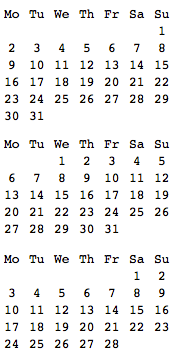Upon receiving month and year in YYYYMM format, generate output of the corresponding calendar month for that year.
For example the input 201312 should generate the following output:
Mo Tu We Th Fr Sa Su
1
2 3 4 5 6 7 8
9 10 11 12 13 14 15
16 17 18 19 20 21 22
23 24 25 26 27 28 29
30 31
Only trick is, NO native calendar generating functions... so Linux clones, no "cal" function... Muahahahahah!
PS: The calendar must start out with Monday as the left-most day, this is to ensure that the output is like the "cal" function, but does not output like "cal", which has Sunday as its left-most day...
Smallest code size wins.

